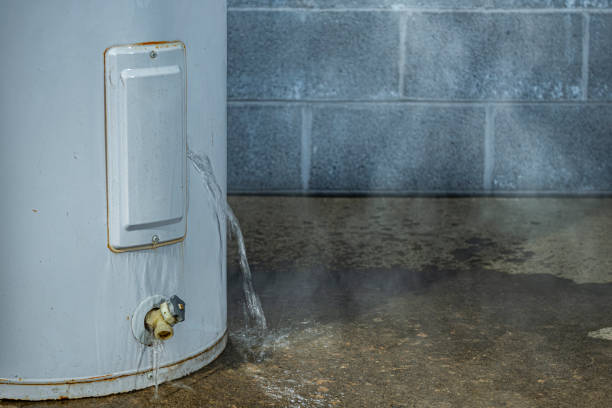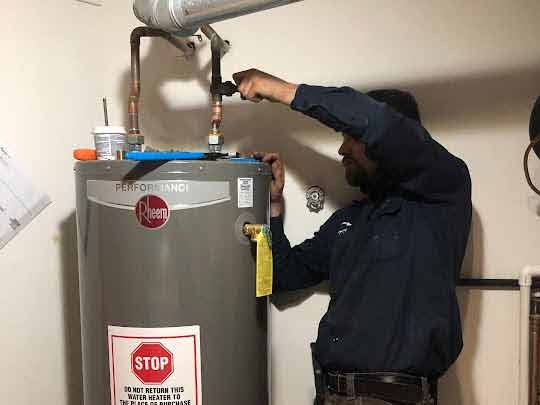
Water heaters are an essential appliance in any home, providing hot water for bathing, cooking, and cleaning. However, like any other appliance, they can develop problems over time. One of the most common issues that homeowners face with their water heaters is a leak. A leaking water heater can not only result in a significant amount of water wastage but can also cause damage to the surrounding area and even your home. If you discover that your water heater is leaking, it’s essential to take immediate action to prevent further damage and ensure the safety of your home and family.
Determine the Source of the Leak
The first step in dealing with a leaking water heater is to identify the source of the leak. This will help you understand the severity of the problem and determine if it’s something you can fix yourself or if you need to call a professional plumber. Here are some common areas where water heaters tend to leak:
- Pressure Relief Valve: This valve is designed to release excess pressure in the tank. If it becomes faulty, it can cause water to leak.
- Drain Valve: The drain valve is located at the bottom of the tank and is used to empty the tank for maintenance or repairs. If it’s loose or faulty, it can cause water to leak.
- Corroded Tank: Over time, the tank can corrode, leading to small cracks or holes through which water can escape.
- Connections: The fittings and connections around the water heater can become loose or damaged, resulting in leaks.
Shut Off the Power and Water Supply
Once you have identified the source of the leak, it’s crucial to shut off the power and water supply to the water heater to prevent any further damage. This will ensure your safety while you work to resolve the issue. Here’s how you can do it:
- Electric Water Heater: Locate your electrical panel and turn off the circuit breaker that controls the water heater. If you have a gas water heater, turn the gas supply valve to the “off” position.
- Water Supply Valve: Close the water supply valve located on the cold water inlet pipe. This will stop the flow of water into the tank.

It’s crucial to shut off the power and water supply to the water heater to prevent any further damage
Addressing the Leaks
Depending on the source of the leak, you can take different approaches to address and fix the problem. Here are some steps you can take:
- Pressure Relief Valve Leak: If the pressure relief valve is leaking, it may indicate that the pressure in the tank is too high. You can try releasing some water from the valve to see if it stops the leak. However, if the problem persists, you may need to replace the valve.
- Drain Valve Leak: If the drain valve is leaking, check if it’s loose. You can try tightening it with a wrench. If that doesn’t solve the issue, you may need to replace the valve.
- Corroded Tank: If the tank is corroded and causing leaks, it’s likely that you will need to replace the water heater entirely. Corrosion is a sign of significant damage, and repairing it may not be a long-term solution.
- Connections: If the connections around the water heater are leaking, you can try tightening them with a wrench. However, if the leakage continues, it’s best to call a local plumber to examine the fittings and make any necessary repairs.
Preventive Measures
To avoid water heater leaks in the future, there are a few preventive measures you can take:
- Regular Maintenance: Schedule yearly inspections with a professional who can check for any signs of wear and tear and perform necessary maintenance tasks.
- Temperature and Pressure Monitoring: Keep an eye on the temperature and pressure settings of your water heater. Excessive pressure can lead to leaks, so ensure they are within the recommended range.
- Replace Anode Rods: Anode rods are sacrificial rods that attract corrosive elements and protect the tank from rust. Over time, these rods can deteriorate, so it’s important to have them replaced as needed.
- Consider a Water Softener: If you live in an area with hard water, the minerals in the water can contribute to the corrosion of your water heater. Installing a water softener can help minimize the impact of these minerals.

When in doubt, always seek the guidance of a professional plumber to ensure the safety and efficiency of your water heater.
When to Call a Professional
While you may be able to address some minor water heater leaks on your own, it’s crucial to know when to call a professional plumber. Here are some situations where professional assistance is recommended:
- Major Leaks: If the leak is substantial or causes water to accumulate rapidly, it’s best to turn off the water supply and seek professional help immediately.
- Gas Water Heater: If you have a gas water heater and you suspect a gas leak along with the water leak, evacuate your home and call a professional immediately.
- No Hot Water: If your water heater is leaking and you’re experiencing a lack of hot water, it may be an indication of a more significant underlying issue that requires professional attention.
- Not Comfortable Fixing It Yourself: If you don’t have the necessary tools, knowledge, or confidence to fix the issue yourself, it’s always better to rely on a plumber who can repair or replace your water heater.
In Conclusion
Discovering a water heater leak can be a stressful situation, but by following the appropriate steps, you can effectively address the issue and minimize damage. Remember to shut off the power and water supply, determine the source of the leak, and take the necessary actions to fix the problem. Regular maintenance and preventive measures can also help prevent water heater leaks in the future. And, when in doubt, always seek the guidance of a professional plumber to ensure the safety and efficiency of your water heater.